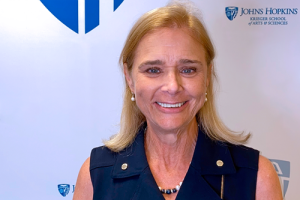A Vision to Advance Online Education and Student Success
Published July 16, 2025
 Veronica Donahue, PhD, recently received an appointment to UPCEA’s Council for Chief Online Learning Officers, the country’s leading online and professional education association. Donahue, the Associate Dean for Graduate and Professional Programs in the Krieger School of Arts and Sciences at Johns Hopkins University, joins 12 other higher education professionals dedicated to guiding digital transformation in postsecondary education. A member of UPCEA since 2012, she will work with fellow C-COLO members to develop avenues of online thought leadership and strategies to share with higher education institutions nationwide, discussing emerging trends and best practices that will engage students now and in the future.
Veronica Donahue, PhD, recently received an appointment to UPCEA’s Council for Chief Online Learning Officers, the country’s leading online and professional education association. Donahue, the Associate Dean for Graduate and Professional Programs in the Krieger School of Arts and Sciences at Johns Hopkins University, joins 12 other higher education professionals dedicated to guiding digital transformation in postsecondary education. A member of UPCEA since 2012, she will work with fellow C-COLO members to develop avenues of online thought leadership and strategies to share with higher education institutions nationwide, discussing emerging trends and best practices that will engage students now and in the future.
“I am excited to join this dynamic leadership community. I am most looking forward to learning more from my colleagues about the next step in higher education,” said Donahue, who will serve a two-year term. “I do not view online content delivery and student learning as a challenge but as an opportunity. My goal is to build upon the work we already engage in at the Krieger School and keep us progressing and moving forward in the digital education space.”
Donahue joined JHU in 2018 and will have much to contribute to these crucial conversations. While the 2020 COVID-19 pandemic forced many institutions to quickly pivot to an online modality, the Krieger School’s portfolio of graduate and professional programs has offered intentionally designed online courses since 2004.
“Our biggest changes in demand came after the pandemic,” said Donahue, who received her bachelor’s degree in political science from Syracuse University, a master’s degree in media studies from The New School University in New York, and master’s and doctoral degrees in political science from Johns Hopkins. “Previously, we were able to offer some online courses and many on-ground. After the pandemic, our students voted with their feet. Many students continued to work either remotely or hybrid, and they wanted to continue their academic journey online. Since most of our students are working professionals, enrolling in an on-ground course became problematic. Our students were no longer captured by place and demanded more online opportunities to learn.”
Having spent the past 20 years in academia (she served in multiple positions in Georgetown University’s School of Continuing Studies from 2006-18, including a stint at its Qatar campus), Donahue had a front row seat to what she categorizes as a “rough start” for online education.
“At the start, people did not view online education as a quality option,” she said. “At Hopkins, we have made a concerted effort to maintain the integrity of the University’s reputation. We ensure that we develop, implement, and deliver online offerings that meet the rigor of a Hopkins degree.
“When I came to Hopkins, there was a clear division between online and on-ground student learning,” she continued. “However, the classifications of online or on-ground were no longer applicable, because so many students were moving seamlessly between modalities.”
Donahue concluded that aligning resources was essential to ensuring a consistent student experience across all modalities. To achieve this, she concentrated on fostering a sense of community for all students. “At the Krieger School, we build community through resources and accessible programming, without making a distinction between ‘online’ and ‘on-ground’ students.”
Keeping Up with Technology
The success of that community is fundamentally reliant on the quality and effectiveness of technology, which is essential for both the online and in-person classes. “You have to have people on your team who are engaged in technology,” Donahue said, “and who are constantly training and re-training, staying abreast of emerging trends and breakthroughs. One of the benefits of my involvement with C-COLO is the exchange of ideas and discussions about the next big thing in digital innovation.”
Her work with C-COLO will place her at the forefront of discussions on many important topics, including in-depth looks at the impact of Artificial Intelligence on operational efficiency and academic integrity and on how AI tools can enhance the digital learning experience. She is grateful to have a seat at the table and eager to dive into those pivotal conversations.
“It may sound cliché to say that online learning allows us to meet people where they are, which absolutely it does, like never before.” she said. “But in addition to that, we are meeting people in terms of how they learn. Classrooms no longer have uniform desk arrangements, and advances in medicine and technology show that students learn differently. Fortunately, online education is an essential approach to address these individualized learning needs.”
Interested in pursuing a graduate degree at Johns Hopkins University?
Request information to learn more or apply here.